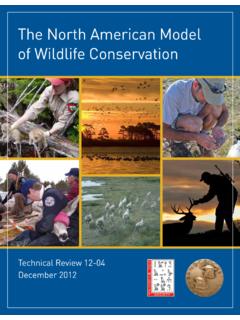Transcription of Becoming a Wildlife Conservation Officer
1 Becoming a Wildlife Conservation Officer Wildlife Conservation Officers are the Pennsylvania Game Commission s field officers and most visible employees. Applicants for these civil service positions must be in excellent physical condition, have knowledge of hunting and outdoor activities and be able to interact positively with people of all backgrounds. Employees in this classification are selected and appointed following a competitive examination conducted by the Pennsylvania Civil Service Commission.
2 Officers begin their careers as Cadets assigned to the Ross Leffler School of Conservation , the Game Commission s training school located in Harrisburg, and are required to complete the training program there. Classes are normally formed every two or three years or as necessary to maintain the complement of officers in the field. BASIC REQUIREMENTS AND QUALIFICATIONS: Applicants must be a resident of Pennsylvania. Applicants must have completed 60 college credits or have two years and a minimum of 400 service hours as a commissioned Deputy Wildlife Conservation Officer for the Commonwealth of Pennsylvania or have four years of active duty military service with honorable discharge.
3 Persons interested in entering this occupation are encouraged to take courses in Wildlife management, environmental sciences, police sciences and similar fie lds of study. Applicants must be 21 years of age as of the date of enrollment at the Training School. Must possess an active Pennsylvania non-commercial Class C driver s license. Must have possessed a hunting license for at least two years prior to the date the examination is announced. Applicants must pass a competitive written and oral examination administered by the Civil Service Commission.
4 Any offer of employment is conditional upon successful completion of the medical, vision, hearing, physical, strength, fitness and agility, stress, drug scan, and swimming tests. A confidential psychological evaluation, pre-employment background and character investigation, credit history and criminal background check including child welfare clearances will be completed for all applicants considered for employment. Additionally, once appointed you must be willing to: Work days, nights, weekends and holidays as assigned Travel overnight as assigned Live away from home during the training period of approximately 50 weeks Live and work closely with other cadets in a paramilitary environment You must be willing to wear an issued uniform and conform to Pennsylvania Game Commission policies on grooming and conduct Relocate to any district within the state upon graduation TRAINING.
5 The Ross Leffler School of Conservation has been the agency s training facility for Conservation Officers since 1932. The school is part college, part police academy and part museum. The training program is about 50 weeks. The curriculum consists of more than 1,400 hours of instruction on more than 140 subjects taught by nearly 200 instructors. Many instructors are agency employees. Cadets are paid $1, bi-weekly and receive the same employee benefits given to all Commonwealth employees.
6 Lodging and meals are provided at the training school at no charge. Weekly, cadets report to the school Sunday evening and remain there until they are released Friday afternoon. They are required to reside at the school. Cadets are granted leave on Wednesday evenings for several hours. Otherwise, they are required to remain on the grounds. Evening classes or activities are held Mondays, Tuesdays and Thursdays unless the training schedule demands otherwise. Weekends are generally free of duty. On duty-free weekends Cadets must vacate the training school.
7 Housing accommodations for the families of Cadets are not available. A cadet s day is busy. First call is 0515. They are in formation for physical training (PT) at 0530 for one hour of PT. Breakfast is at 0700. Classes run from 0800 until 1200, and again from 1300-1700 after a lunch break. After dinner, evening classes run from 1800-2000 or later as needed. In addition to classes, cadets are required to perform maintenance and cleaning details while at the school and maintain their quarters and personal effects in order and pass daily inspections.
8 Lights out is at 2230 after which quiet hours are in effect. Any unoccupied time is used to perform daily details, prepare for exams, work on class projects or practice various skills taught. Cadets are required to attend all classes. Classes may be indoors or outdoors depending upon the subject and type of instruction required. Cadets must listen to, read, and be able to assimilate large quantities of information. They must be able to observe, learn and perform many job-related skills. Academically, cadets are required to maintain at least an 80 percent average of all tests and quizzes.
9 Certain critical subjects require 100 percent proficiency. Candidates are required to pass basic strength, fitness and agility tests early in the selection process. At the school, cadets participate in a progressive physical training program designed to develop strength and flexibility and endurance related to performing job functions and reducing injury. Cadets must pass a physical fitness test in order to participate in field assignments. Cadets are expected to demonstrate a high standard of conduct and be courteous and respectful to all staff, instructors, classmates, visitors and the public.
10 Failure to meet any standards set by the school or to follow Game Commission or Commonwealth regulations is cause for dismissal from the program. The use of cell phones and other modes of electronic communications are restricted at the school. Cadets are permitted to possess and use these devices only at certain times. Leave is granted only in extreme situations and as the schedule permits and cadets are required to make up any class work they miss. Cadets provide their own uniforms to begin training as per instructions provided.













